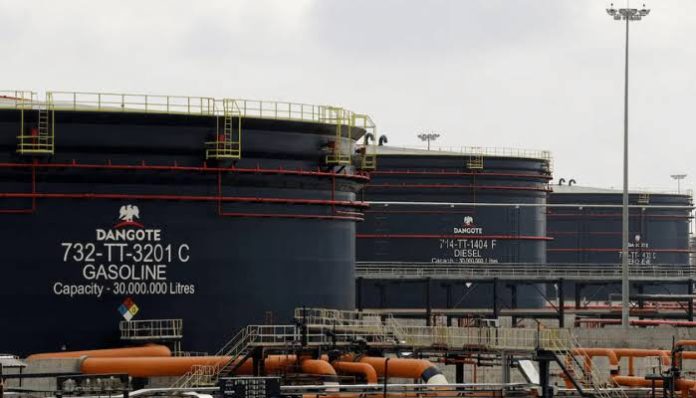Nigeria, long known as Africa’s biggest importer of refined petroleum products, has ceded that position to South Africa, marking a dramatic shift in the continent’s energy landscape.
The development follows the operational ramp-up of Aliko Dangote’s massive oil refinery, which began large-scale production in 2024 and is already reshaping trade flows across sub-Saharan Africa.
The $20 billion Dangote Refinery, situated on the outskirts of Lagos, boasts a refining capacity of 650,000 barrels per day, making it the largest single-train refinery in the world.
Its gradual increase in output has significantly cut Nigeria’s reliance on imported petrol, disrupting the long-established pattern where the continent’s top oil producer sent crude overseas to be refined and reimported at high cost.
According to energy consultancy CITAC, Nigeria imported 3.1 million tons of refined petroleum products in the first quarter of 2025, a sharp drop compared to previous years.
In contrast, South Africa brought in 4.2 million tons over the same period, cementing its new status as Africa’s largest fuel importer.
“Nigerian imports are dropping as a result of the continued operation of Dangote,” said Elitsa Georgieva, executive director at CITAC.
“Since the beginning of this year, South African imports have been consistently highest in sub-Saharan Africa,” he added.
The refinery’s impact reflects a broader ambition across the continent to boost domestic refining capacity and reduce dependence on foreign supplies.
Countries like Uganda, Angola, and Mozambique have launched projects aimed at increasing local processing capabilities.
Yet, even with vast oil reserves, translating ambition into operational output has proven difficult, a reality Dangote’s lengthy journey demonstrates well.
The Dangote Refinery faced multiple delays, cost overruns, and logistical challenges before finally coming online.
But its operation represents a milestone for Nigeria’s energy security and trade balance.
For decades, the country paradoxically relied on imported petrol despite producing over 1.3 million barrels of crude oil per day.
That dynamic has begun to change, even if modestly, with Dangote’s facility absorbing more of the country’s domestic crude and reducing the need for costly imports.
Still, this progress comes at a time when South Africa finds itself increasingly reliant on fuel imports.
Despite once possessing substantial refining infrastructure, nearly half of the nation’s refining capacity has been shut down since 2020 due to industrial accidents, ageing equipment, and a chronic lack of investment.
According to Transnet SOC Ltd, South Africa’s state-run logistics firm, imports now supply more than 60 percent of the nation’s fuel demand.
To make matters worse, the country’s largest refinery, Sapref, a joint venture between Shell Plc and BP Plc, was idled in 2022.
While the government purchased the facility in 2023 in hopes of reviving it, no timeline for a restart has been confirmed.
With local refining largely stagnant, traders such as Glencore Plc and Vitol SA have seized the opportunity to ramp up deliveries to South Africa.
CITAC projects that the country will import around 15.5 million tons of refined products in 2025, nearly twice as much as Kenya (8.9 million tons) and more than double Nigeria’s projected imports of 6.4 million tons.
This has made South Africa an increasingly attractive market for global fuel suppliers.
Swiss commodities giant Gunvor was among those shortlisted to acquire Shell’s downstream retail network in South Africa, signalling growing international interest in the country’s fuel distribution sector.
“South Africa’s infrastructure is mature, but its refining shortfall is now attracting foreign traders who can bridge the gap,” said one industry executive familiar with the negotiations.
Despite losing its title as Africa’s top fuel importer, Nigeria stands to benefit significantly from the rise of the Dangote Refinery.
Reduced import dependency could bolster the naira, ease pressure on foreign exchange reserves, and improve trade balances.
For the Nigerian government, which has historically subsidised fuel imports at great fiscal cost, this represents a potential turning point.
For South Africa, the import surge brings both risks and opportunities.
While it ensures fuel availability in the short term, reliance on foreign supply exposes the country to price shocks, currency volatility, and supply chain disruptions.

